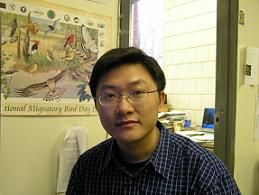Baseline Study of Aquatic Macroinvertebrates in the Red River of the North - Main Stem

Wei Zheng is interested in freshwater ecology, community ecology (with emphasis on macroinvertebrates), large rivers and streams. Wei earned his Bachelor’s degree (1999) in Forest Conservation at FAFU, China, with emphasis on Entomology and Pathology, and a Master’s degree (2003) from the same university with research on Nematology and Nematode Ecology. Wei is currently pursuing a Ph.D degree in the ECS program under the direction of Dr. Malcolm Butler, studying aquatic invertebrates in the Red River of the North.
Email: wei.zheng@ndsu.edu
Phone: 701-793-4311
Fellow: Wei Zheng Program of Environmental and Conservation Science, NDSU
Advisor: Malcolm Butler Department of Biological Science, NDSU
Matching Support: Environmental and Conservation Sciences Program; NDSU Graduate School; USBR - Dakotas Area Office (support pending)
Degree Progress: Ph.D expected in Dec.2008
Baseline Study of Aquatic Macroinvertebrates in the Red River of the North - Main Stem
Project Objectives:
Our study is a survey of macroinvertebrate communities in major habitats of the main-stem Red River. We will assess the overall diversity of the invertebrate fauna, determine what types of animals predominate in diverse habitats within this river. We seek to identify ecologically significant taxa in terms of abundance or functional importance in the river, and to determine candidate indicators for future biomonitoring. We will also assess a range of sampling techniques for monitoring this fauna. This information will be used by the Aquatic Ecosystem Committee of the International Red River Board and its collaborators to develop a broader research proposal for comprehensive biological monitoring of the Red River main stem by multiple jurisdictions.
Progress:
I attended a November 2005 workshop on biological monitoring of the Red River, convened by the Aquatic Ecosystem Committee of the International Red River Board to explore development of a biological monitoring program for the Red River. I have obtained financial support from the ND WRRI, and a research proposal will be submitted to the USBR in May 2006. We are currently developing specific plans for sampling during summer of 2006.
Significance:
From the data to be collected in this two-year study, we expect to characterize the overall diversity of invertebrate organisms that occur in this portion of the main stem Red River. Currently, no such synoptic, taxonomic list of the river’s invertebrate fauna exists. In addition, we will be able to characterize the contribution of different habitat types to overall invertebrate abundance and diversity. Our standardized and quantitative methods, along with stratification of discrete riverine habitats, will allow us to express the quantitative importance of all components of the fauna – including taxa of potential ecological significance that may have been neglected in previous surveys. By employing a range of sampling techniques, we will be able to judge the efficacy of different sampling methods for characterizing taxa that may be significant indicators of the river’s function and condition.
Presentations (Chronological Order):
“ Compare macroinvertebrate community between fish and fishless wetlands”. NDSU department of biological science Zoology 496/696: Wildlife and fishery management techniques Fargo, ND May 5, 2005
“A survey of macroinvertebrates on the Red River of the North”. NDSU Department of Biological Sciences Zoology 470/670: Limnology, Fargo, ND Dec 12, 2005
“A baseline study of aquatic macroinvertebrates on the Red River of the North” NDSU ECS seminar Fargo, ND May 25, 2006

Melcolm Butler
Biological Sciences
Office: Research 2, Room 214B
Phone: 701-231-7398
Email: malcolm.butler@ndsu.edu


